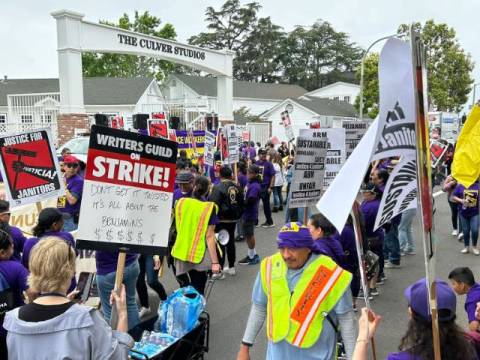Several hundred janitors marched to join writers on the picket line outside Sony Pictures and Amazon Studios Thursday, as some custodial staff have lost their jobs while productions are halted.

According SEIU United Service Workers West, about 50 of its members in the Los Angeles area have been laid off so far. The union did not have an estimate for impacts on custodial workers in other major filming hubs like Georgia and New York.
Natalia Lopez, a single mom who has cleaned offices at Paramount Studios for seven years, said she was asked not to come into work. She has been unemployed for five days, while other coworkers were laid off earlier. She joined hundreds of janitors marching through Culver City in solidarity with writers.
Right now, I'm spending money from the little savings that I have. If there's no work, there's no money. We're losing $20.74 per hour, Lopez said, Food now is just the basics, like just rice and beans.
With the potential for SAG-AFTRA to strike if a deal is not reached by June 30, more productions could come to a standstill.
We understand that this could get worse before it gets better. But we know if we win, it's only going to get better, said David Huerta, president of SEIU-USWW. There is a significant amount of anxiety over the potential loss of jobs. But our members more than anything understand what it means to sacrifice, what it means to struggle.
Outside of Netflix in Hollywood on Wednesday, Writer Rebekah Kohler recognized that janitors and local restaurant workers are among those taking a hit: I go to a restaurant that's in my neighborhood and they've seen their sales decline. People aren't going out to eat as much...It's like dominoes. Like, as soon as we go down, people follow.
Outside of Warner Brothers Discovery, CNN's parent company, Stagehand Amanda Winter said the production halt affects everyone.
Janitors, people who drive the trucks for movies, people who make the sets. Everybody involved in making a show or a movie or anything, that's all at a standstill right now. Every single one of them, they're not working, Winter said.
The financial losses due to the WGA strike will be felt much sooner than the 100-day strike of 2007-08, according to Kevin Klowden, chief global strategist of the Milken Institute.
While the strike about 15 years ago was estimated to have caused a $2.1 billion loss, not adjusted for inflation, Klowden said this time, the industry was anticipating the strike and laying people off earlier. Klowden said this compounds with the struggles businesses were already feeling from pandemic closures and puts into question their resiliency.
Several businesses anecdotally already started cutting staff, Klowden said. Then does it become permanent?
Klowden noted the dry cleaners, caterers, Star Wagons, restaurants, and custodial staff. He said those peripheral job losses may take time to get reported and filled again.
He said another major difference between this writers' strike and the last one is the number of productions now done outside of California, such as Georgia or New York, spreading out the economic impact geographically.
The Motion Picture Association told CNN that in 2021, the film and TV industry supported 822,000 direct jobs, while supporting a total of 2.4 million jobs. The association said a major motion picture shooting on location contributes an average of $250,000 per day to the local economy, while a single one-hour television episode shooting on location contributes an average of $150,000 per day.
